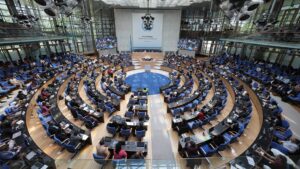
across the world.
Amnesty points out that 2024 was the hottest year ever recorded, with deadly heatwaves, wildfires, floods, and food shortages hitting millions. The world has already crossed the key 1.5°C warming limit set in the Paris Climate Agreement, raising fears of irreversible damage.
Amnesty also criticized governments for continuing to fund fossil fuel industries, which are the main drivers of this crisis. It warned that such actions put basic rights like life, food, water, and housing at risk.
Vulnerable Communities Face the Worst
The report highlights that the poorest and lowest-emitting nations suffer the most. Indigenous groups, small farmers, island nations, and those living near fossil fuel plants are at greater risk. For example, Pakistan emits less than 1% of global greenhouse gases but faces extreme floods and deadly heatwaves. Many of these deaths could have been prevented with better protection for the poor, children, and the elderly.
Amnesty also raised concerns for environmental defenders who protect land and natural resources. In many countries, these activists are being harassed, jailed, or even killed. The report cited recent cases in Azerbaijan and Brazil, the next COP30 host, where defenders of nature face serious threats.
Rich Nations Must Pay Fairly
Amnesty accused rich nations of failing to meet their climate finance promises. Many poorer countries spend more on paying off debts than they receive in climate aid even though they are the ones hardest hit by climate change. Amnesty demanded that rich nations:
•Give grants, not loans, for climate adaptation
•Pay reparations for climate-related loss and damage
•Ensure fair, fast, and needs-based funding
The group suggested that taxing fossil fuel companies, the ultra-rich, and windfall profits could raise $3 trillion a year—money that could help protect the planet and vulnerable people.
Call for a Fair and Just Transition
Amnesty called for a total global shift away from fossil fuels, but in a way that protects workers and communities. The transition must:
•Respect human rights
•Provide training for workers in new industries
•Avoid false solutions like risky technologies or carbon offset schemes that do not truly cut emissions
Amnesty also criticized climate summits for blocking activists’ voices. It demanded open, safe, and inclusive talks, warning that host nations like Brazil must protect freedom of speech at COP30.
The Road to COP30: A Moment of Truth
As Brazil prepares for COP30, Amnesty urged the country to lead by example, warning that its own policies like expanding oil and gas projects undermine its green promises.
Amnesty final warning is stark: without fast, inclusive, and justice-driven action, the world risks an era of climate-driven suffering and loss that cannot be undone.
